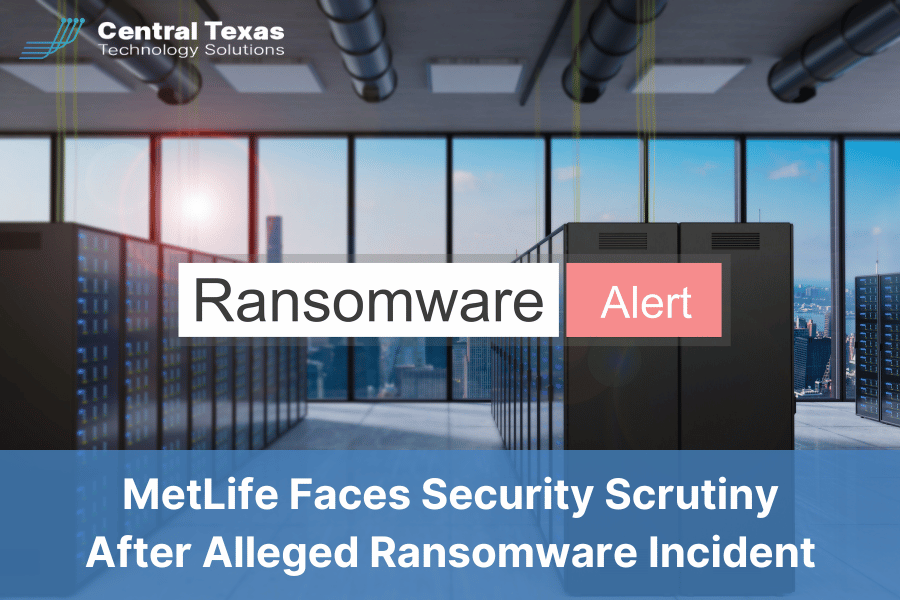
Growing Concerns Over a Potential Ransomware Attack
Many business owners provide essential employee benefits like retirement plans, dental insurance, and accident coverage. One of the largest financial service providers offering these benefits is MetLife, which operates globally. If MetLife is your insurance provider, you may be wondering how the recent alleged ransomware attack could impact your business and employees.
RansomHub’s Allegations: A Major Data Breach?
RansomHub, a notorious ransomware group that emerged in 2024, has claimed responsibility for a ransomware attack on MetLife. The cybercriminals alleged they stole 1 terabyte of sensitive data from the company's databases through a ransomware-as-a-service operation.
What Was Allegedly Stolen?
According to Cybernews, the stolen data allegedly included:
- A meeting log from December 11th detailing customer-impacting internet issues
- Documents from a July 2024 Executive Board meeting
- Investment and financial records
- Information on MetLife’s operations in Brazil, Colombia, and Chile
All leaked documents were in Spanish, leading Cybernews to speculate that MetLife’s Latin American division may have been the target of the attack.
To add pressure, RansomHub posted MetLife’s name on their homepage, accompanied by a countdown clock that initially showed 11 days remaining for the company to pay an undisclosed ransom. Despite these claims and apparent evidence, MetLife has strongly denied any such breach.
MetLife’s Official Response: Denying the Ransomware Attack
A MetLife spokesperson refuted the allegations, stating that no such attack has occurred within any department of the company. The spokesperson acknowledged that a subsidiary, Fondo Genesis, had recently suffered a breach but insisted that the Ecuador-based financial services firm does not operate within MetLife’s enterprise systems. As a result, any cyberattack on Fondo Genesis would be isolated from MetLife’s core operations.
This alleged attack was reported to have occurred on New Year’s Eve. However, this is not the only claim being made against MetLife.
Additional Allegations: The MOVEit Data Breach Controversy
A separate report from Hudson Rock, a data intelligence firm, claimed that MetLife was affected by the widespread MOVEit hack, which exposed nearly 600,000 records. However, MetLife has denied any involvement, stating that neither the company nor its subsidiaries were compromised in the breach.
What This Means for MetLife Customers
With conflicting reports from cybersecurity experts and MetLife’s firm denial, the situation remains uncertain. Here’s what customers should keep in mind:
- MetLife has not confirmed any ransomware attack on its core systems.
- A subsidiary, Fondo Genesis, did experience a breach, but it operates independently.
- Claims of a MOVEit-related data leak have also been refuted by the company.
For now, if you’re one of the 100 million MetLife customers worldwide, there is no immediate cause for alarm. However, staying vigilant and monitoring updates from both MetLife and cybersecurity authorities is essential to ensuring the safety of your financial and personal information.
FAQ: Ransomware Attack Claims Against MetLife
1. Has MetLife confirmed a ransomware attack?
No, MetLife has denied all claims of a ransomware attack on its enterprise systems. While a subsidiary, Fondo Genesis, did experience a breach, the company asserts that it is independent of MetLife’s main infrastructure.
2. What should MetLife customers do to protect their data?
Although MetLife has denied any attack, it’s always wise to follow cybersecurity best practices, such as monitoring account activity, using strong passwords, and enabling two-factor authentication where applicable.
3. Is there any proof that MetLife’s data was stolen?
RansomHub claims to have stolen 1 TB of data, including financial and investment records. However, MetLife maintains that no breach occurred, and independent verification of the alleged stolen data has not been confirmed.
Contact CTTS today for IT support and managed services in Austin, TX. Let us handle your IT so you can focus on growing your business. Visit CTTSonline.com or call us at (512) 388-5559 to get started!
